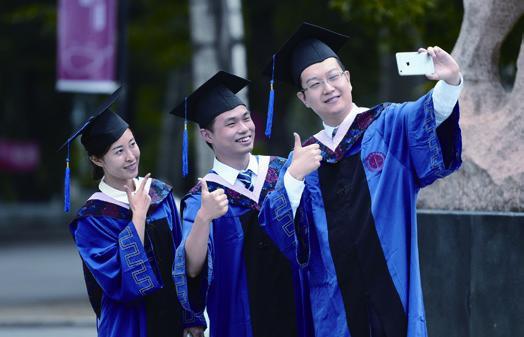Promising Alternatives
By Lu Yan
Wang Qiwen graduated in June from the Communication University of Zhejiang, in Hangzhou, Zhejiang Province in east China. However, in contrast to many fresh college graduates who are still struggling to land a job, Wang has already quit her fi rst job.
As a broadcast major, she worked as an intern at a radio station and a TV station during her college years. Upon graduation, the 22-year-old was hired by a multi-channel network, but she wasnt happy because she felt that she couldnt fully use her creativity and realize her value.
“I just didnt feel the job was right for me, so I quit,” she said, adding that she has several job ideas in mind, such as project planner, operating offi cer, marketing personnel or even barista. She wants to take some time to try them out so she can fi gure out what she wants to do in life.
“I dont know if Im being too naive, but I really want to go through trial and error while Im still young,” Wang said.
According to statistics from the Ministry of Education, there are 8.74 million fresh college graduates this year, 400,000 more than last year, hitting a record high.
While the majority of them are looking for jobs or have already found employment, some have decided to choose other paths, such as further education. This year, Chinas education authority expanded postgraduate enrollment by nearly 190,000.
Taking it slow
Lu Yuanyuan, 21, graduated from a mediocre college in her home province this year. In the hopes of seeing the outside world and gaining more knowledge, she took part in the postgraduate entrance exams, but failed to get into the higher learning institution of her dreams. Nevertheless, she would not give up and is devoting herself to study for next years exam. At the same time, shes also preparing for the civil servant exam.“There is no harm in trying out different options,” she said.Some graduates are choosing to carefully plan their career paths and not rush into the job market. Wei Yu graduated from Shandong University of Science and Technology this year, but instead of accepting an offer from a real estate agency, he said he prefers to wait for more satisfying options.
“I chose to pass up the opportunity because I found it wasnt really what I wanted. I know the current job market is not very optimistic, but I would rather take it slow until I fi nd what suits me,” Wei explained.
Li Lei, a graduate from the Southwest University of Political Science and Law, had been preparing for studying overseas for a couple of years. However, due to the novel coronavirus pandemic, he had to postpone his study plans and take alternate steps, accepting an internship at a company which he sees as an opportunity to gain experience.
Wang Xu, Secretary of the Communist Party of China Committee of Chongqing University, said she believes that there are multiple reasons behind the “take it slow” attitude among college graduates.
Some graduates dont have much fi nancial pressure, so they can choose to take time before fi nding what they actually want to do. Meanwhile, others dont have a clear career plan, and when looking for jobs they feel at a loss or even encounter setbacks.
“Many of them are shy, or lack of the confidence or motivation to get employment. We need to provide more care and guidance for them, such as offering job searching skills and psychological counseling, as well as fi nancial assistance to povertystricken graduates, which will better facilitate employment for them so they can enter adult society,” Wang Xu told Xinhua News Agency.
Entrepreneurship
In July, Zhao Heng graduated from the School of Journalism and Communication of Shanghai International Studies University. But instead of looking for a job at a corporation or pursuing further education, he decided to become an entrepreneur and start his own tutoring center.He found his passion for teaching while working as a part-time tutor for high school students during his college years. He taught over 60 students, and received satisfying results with students grades improving signifi cantly.
Zhao used to work for large tutoring institutions, but he realized he would prefer to work for himself, since it would enable him to adopt more fl exible and innovative teaching methods that work better for his students.
Four months before graduation, Zhao started preparation for launching his tutoring center in Shanghai, including renting and renovating offi ces, applying for industrial and commercial registration and hiring tutors, among other things.
Unfortunately, his entrepreneurship was affected by the epidemic, with construction work for his tutoring site having to be suspended. He had been planning to offer online tutoring before the epidemic was brought under control.
“We encourage graduates to explore more channels of employment, given this years complicated employment situation posed by the epidemic and the economy,”said Cao Shujing, head of the Career Service Center of Shanghai International Studies University.
Currently, local authorities nationwide have introduced policies to support college graduates who want to start their own business after graduation.
In Xiongan New Area in Hebei Province, north China, graduates can apply for a guaranteed loan of up to 200,000 yuan ($28,500), while entrepreneurs who want to jointly start a business can apply for a guaranteed loan of up to 1.3 million yuan ($185,600).
In June, Dalian Talent Service Center in Dalian, Liaoning Province in northeast China, released a brochure on supporting college graduates who want to be entrepreneurs. It stated that the local government can provide 3,000 yuan ($428) per year for up to two years as a rent subsidy for those who get a business license and rent a physical place for business operation.
Beginning this year, college graduates in Beijing who turn to flexible employment right after graduation can apply for flexible employment social security subsidies.
“The government plans to provide social security subsidies for graduates choosing fl exible employment, as well as pension and medical protection. This is to relieve future worries and allow everyone to feel free to explore more ways of employment or start a new business in order to realize their ideals and values,” Xu Xi, head of the Beijing Municipal Human Resources and Social Security Bureau, told news portal People.cn.
However, Yang Fang, head of the Offi ce of Innovation and Entrepreneurship Education at Central South University, said that college graduates should be prepared for constantly emerging challenges before they choose to start their own business.
“Entrepreneurship faces great uncertainty,” she said, noting that it is normal for entrepreneurs to find it difficult to start a business, and suggested that graduates should conduct thorough market research before putting their ideas into practice, so that they can have better chance in surviving tough competition.

